- Home
- Charlotte Bronte
Stancliffe's Hotel Page 2
Stancliffe's Hotel Read online
Page 2
'Is he not frenetique, Charles?' said she. 'What nonsense to make such a piece of work about low spirits! I declare he reminds me of Ashworth. He, poor man, after a few days of hard preaching and harder drinking used to say that he had a muttering devil at his side. He told Bromley so once, and Bromley believed him. Would you have done, Charles?'
'Implicitly, madam. Goodnight.'
Charles Townshend decides to
pay a visit to the country
I like the city. So long as winter lasts, it would be no easy task to entice me from its warm and crowded precincts. So long even as spring, with lingering chill, scatters her longer showers and fitful blinks of sunshine, I would cling to the theatre at night and the news-room in the morning. But at last, I do confess, as June advances, and ushers in a long series of warm days, of soft sunsets and mellow moonlight evenings, I do begin to feel certain intuitive longings for an excursion, a jaunt out into the country, a sojourn somewhere far off, where there are woods, pastoral hills and bright pebbled becks.
This feeling came strong over me the other day, when, sitting in Grant's Coffee-House, I took up a fashionable paper whose columns teemed with such announcements as the following:
Preparations are making at Roslyn castle, the seat of Lord St Clair in the North, for the reception of his Lordship's family and a party of illustrious visitors, who are invited to spend the summer quarter amidst the beautiful forest scenery with which that part of the St Clair estate abounds.
Prince Augustus of Fidena set out yesterday, accompanied by his tutor, for Northwood-Zara, whither the Duke and Duchess of Fidena are to follow in a few days.
Lord and Lady Stuartville leave town to-morrow. Their destination is Stuartville Park in Angria.
The Earl of Northangerland is still at Selden House. It is understood that his lordship expresses little interest in politics.
General Thornton and his lady took their departure for Girnington Hall last week. The General intends adding to the plantations on his already finely wooded property in Angria.
The Earl and Countess of Arundel are at their seat of Summerfield House, in the province of Arundel.
General and Mrs Grenville propose to spend the summer at Warner Hall, the residence of W. H. Warner Esqre, premier of Angria.
John Bellingham Esqre, banker, is rusticating at Goldthorpe Mowbray. The physicians have advised sea bathing for the perfect restoration of Mr Bellingham's health, which has suffered considerably from a severe attack of influenza.
The Marquis of Harlaw, with a party of friends, J. Billinger Esqre, Mr Macqueen etc., is enjoying a brief relaxation from state cares at Colonel Luckyman's country house, Catton Lodge.
Lord Charles and the young ladies Flower have joined their noble mother at Mowbray. Sigston's Hotel is engaged entirely for the use of Lady Richton and her household. Lord Charles Flower, who, as well as his sisters, is just recovering from the measles, continues under the care of Dr Morrison, the family physician. The noble ambassador himself is in the south.
From these paragraphs it was evident that the season was now completely over. No more assemblies at Flower House, no more select dinner-parties at the Fidena Palace. Closed were the saloons of Thornton Hotel, forsaken were the squares round Ellrington Hall and Wellesley House, void were the habitations of Castlereagh, darkened the tabernacles of Arundel! Whereas now, in remote woods, the chimneys of Girnington Hall sent out their blue smoke to give token that the old spot was peopled again; in remoter meads, the broad sashes of Summerfield House were thrown up, to admit the gale sweeping over those wide prairies into rooms with mirrors cleared and carpets spread and couches unswathed in holland. Every blind was withdrawn at Stuartville Park, every shutter opened, and the windows through crimson curtains looked boldly towards the green ascent where Edwardston smiles upon its young plantations. The rooks were cawing at Warner Hall with cheerier sound than ever as, early on a summer morning, the Prime Minister of Angria, standing on his front-door steps, looked at the sun rising over his still grounds and deep woods and over the long, dark moors of Howard.
I could have grown poetical. I could have recalled more distant and softer scenes touched with the light of other years, hallowed by higher - because older - associations than the campaign of -33, the rebellion of -36. I might have asked how sunrise yet became the elms and the turret of Wood Church. But I restrained myself, and merely put the question, shall I have me out or not? And whither shall I direct my steps? To my old quarters at the Greyhound opposite Mowbray Vicarage? To my friend Tom Ingham's farm at the foot of Boulshill? To some acquaintances I have North awa' in the vicinity of Fidena? Or to a snug country lodging I know of in the south not far from my friend Billinger's paternal home? Time and chance shall decide me. I've cash sufficient for the excursion; I've just rounded off my nineteenth year and entered on my twentieth; I'm a neat figure, a competent scholar, a popular author, a gentleman and a man of the world. Who then shall restrain me? Shall I not wander at my own sweet will? Allons, reader, come, and we will pack the carpet-bag. Make out an inventory: Item - 4 shirts, 6 fronts, 4 pair cotton, 2 pair silk stockings, 1 pair morocco pumps, 1 dress satin waistcoat, 1 dress coat, 2 pair dress pantaloons, 1 pair nankeens, 1 brush and comb, 1 bottle macassar oil, 1 tooth-brush, box vegetable tooth-powder, 1 pot cream of roses, 1 case of razors (N. B. for show not use), two cakes of almond soap, 1 bottle eau de cologne, 1 bottle eau de mille fleurs, 1 pair curling-irons. C'est tout! I'm my own valet now! Reader, if you're ready, so am I. The coach is coming, hillo! Off at full speed to meet it!
At Stancliffe's Hotel, amongst
the commercial travellers
'Well, I think I shall have to stay at Zamorna all night. It's a delightful June evening.' So I soliloquized to myself, as, standing in the traveller's room at Stancliffe's Hotel, I from the window watched the umbrellas, cloaks, and mackintoshes which ever and anon traversed Thornton Street in Zamorna. It had been market-day, and the gigs of the clothiers, now homeward-bound, were bowling along the pavement in the teeth of the driving showers and fitful blasts in which the before-mentioned delightful June evening had thought proper to veil its close. Now and then a cavalcade of some half-dozen mounted manufacturers passed the window at full trot. These gentlemen had doubtless dined en comite at the Woolpack or the Stuart Arms, and the speed and lightness of their progress, the pleasing gaiety of their aspects, and the frequency of the laugh and jest in their ranks indicated pretty plainly that they were, one and all - to speak technically - market-fresh. Many of the gigs, too, shot past with a vengeable rapidity which warranted that [the] occupants had duly laid in the stock of brandy and water. Wild and boisterous as the wind swept up the street and drove before it a heavy constant rain, these heroes, safe in the external shield of waterproof capes and the internal specific of no less waterproof cognac, dashed away towards the open Edwardston or Adrianopolitan roads, as if in defiance of the storm which was to meet them in fuller force when removed from the partial shelter of the city.
The traveller's room at Stancliffe's Hotel by no means exhibited the silence and solitude of a hermit's cell. Gentlemen in the soft and hard line strode in and out incessantly from the trampled inn-passage, whose wet and miry floor plainly told the condition of the streets outside. Then there were loud calls for the waiters, incessant ringings of the weary bell, orders about sundry carpet-bags and portmanteaus, deliveries of divers wet great-coats and drenched pea-surtouts to be dried instantly at the kitchen-fire, expostulations about mysterious subjects unintelligible except to the affrighted waiter and the aggrieved complainant. One furious individual, whose gig drove up to the Hotel amidst the pelting of a wilder torrent of rain than had fallen in the course of the whole afternoon, entered the room with a dark and ominous aspect. As he was drawing off his three-caped great-coat, from which the water dripped in streams, something in the condition of the fire-place seemed to strike him with conscientious horror. He rushed to the door.
'Waiter! Waiter!! Waiter!!!' he excl
aimed with the voice of a lion.
The waiter came. The person who had summoned him was a portly man and an apoplectic; his rage seemed at first to impede his utterance, but not for long. He opened forth:
'Look at that grate, sir! Do you call that comfort - tawdry rags of blue and yellow paper instead of a good fire?'
'It's June, sir,' replied the waiter. '18th inst. We never put on fire in the low-rooms after May goes out.'
'Damn you,' said the bagman. 'Light a fire directly, or I'll send for your master and give him a jobation to his face about it. Let me tell you, your people here at Stancliffe's get abominably careless. Such a blackguard dinner as I had here last circuit! But I promise you if you set me down to such another I'll put up at the Stuart Arms in future. Light a fire, sir, and take my coat. If you leave a wet thread on it I'll subtract it from the reckoning. Bring me some hot punch and oysters for supper, and mind the chambermaid airs my bed well. I'd damp sheets last time I slept here, I'll be d--ed if I had not.'
Your Angrian commercial traveller is one of the greatest scamps in existence, much on a par with your Angrian newspaper editor. Anything more systematically unprincipled, more recklessly profligate than these men, taking them as a body, is not easy to conceive. Characters indicative of these vices were legibly written in the faces of the half-dozen gentlemen gathered on this stormy evening in the apartment to which I have introduced my readers. Conversation did not flag amongst them. Amidst the ringing of crushers and tumblers, such sentences were heard as the following:
'Brown, I say, you're lucky to have no further to go tonight!'
'Well, and so are you, an't you?'
'Me! I must push on ten miles further if it rain cats and dogs: I must be in Edwardston by nine tonight to meet one of our partners.'
'Which of them: Culpeper or Hoskins?'
'Culpeper, ac--d cross-grained dog.'
'Pretty weather, this, for June ain't it?' interpolated a young dandy with red curls and velvet waistcoat.
'Aye, as pretty as your phiz,' replied the furious man who had ordered the fire to be lit, and who was now sitting with both his feet on the fender, full in front of the few smoky coals which in obedience to his mandates had been piled together.
'I say, can you change me a bank-note?' asked one man with his chin shrouded in a white shawl.
'Bank of Angria or private bank?' said the person whom he had addressed.
'Private bank - of our own Amos Kirkwall and sons.'
'I can change it with our pound notes - Edward Percy's and Steaton's: I got them at their warehouse this afternoon.'
'I'd prefer these any day to sovereigns - less chance of their being counterfeit.'
'Well, and how go politics to-day?' asked a smart traveller in a gold chain, slapping on the shoulder a studious individual deeply absorbed in the perusal of a newspaper.
'God knows!' was the answer. 'I should not be much astonished to hear of the Prime Minister resigning.'
'And he will if he does his duty,' exclaimed a third person. 'Have you seen the War Despatch for this morning? My word, their people do go it!'
'Manly, independent print, the War Despatch,' answered the first speaker. 'Delivers the sentiments of the nation at large. Curse it - who's to hinder us from asserting our rights? Aren't we all free-born Angrians?'
'The Rising Sun swears that Percy has tendered his resignation, and been solicited to withdraw it. What do you think of that?'
'That he had a capital opportunity of discharging with interest many a long bill of insults he has been storing up against the Czar for these three years at least.'
'But I think it would hardly be like him to let such an opportunity pass, if it be so. Brandy and Water! He'll serve them out next sessions, in style.'
'By G--d, that he will, and before next sessions too. A propos of that, they say some of the leaders in the War Despatch are penned by him.'
'Very likely; he's a real trump-card. Do you deal with him?'
'No, our house is in the cutlery-line.'
'We do, or rather, we did a while since; but he screwed so hard in that last bargain about some casks of madder, and came down so prompt for payment at a time when ready money was rather scarce with us, that our senior partner swore upon the Gospels he'd burn his fingers in that oven no more.'
The furious man, who had hitherto sat silent, here turned from the fire which he had by this time coaxed into something like a blaze and growled sotto-voce: 'Shall be happy to supply you, Mr Drake, with madder, indigo, logwood and barilla of all qualities on the most reasonable terms. Shall feel obliged if you will favour me with an order. May I put you down?' He drew out a pocket-book and unsheathed a pencil.
'Of what house?' asked Mr Drake.
'I do for Milnes, Duff & Stephenson, Dyers, Anvale,' answered the fire-eater.
'Humph!' rejoined Drake with a kind of sneer. 'I've seen that firm mentioned somewhere.' He affected to ponder for a moment, then, snapping his fingers: 'I have it! It was in the Gazette. Paid a second dividend, I think, a month ago - half-a-crown in the pound.'
The man of choler said nothing: he was flabbergasted. But he leaned back in his chair, and, lifting both feet from the fender, he deposited one on each hob. His favourite element, now burning clear and red, seemed to console him for every contre-temps.
'Drat it, the weather's clearing!' suddenly ejaculated that gentleman who had declared his obligation to be at Edwardston by nine o'clock. He rushed out of the room and, having peremptorily ordered his gig, rushed back again; and having swallowed the contents of a capacious tumbler besought Dawson to help him on with his d--d mackintosh. Then, as he settled the collar about his neck, he bade an affectionate adieu to the said Dawson in the words:
'Go it old cock! goodbye! Judging by thy nose next circuit will use thee up.'
I saw him from the window mount his gig and flash down the still wet street like a comet.
In truth, the clouds for the first time that day were now beginning to separate. The rain had cease[d]; the wind likewise had subsided; and I think, if I could have seen the west, the sun, within a few minutes of its setting, was just shedding one parting smile over the Olympian. Several of the travellers now rose. There was a general ordering out of gigs and assuming of coats and cloaks. In a few minutes the room was cleared, with the exception of two or three whose intention it was to take up their quarters at Stancliffe's for the night. While these discussed professional subjects, I maintained my station at the window, watching the passengers whom the gleam of sunshine had called out at the close of a rainy day.
In particular, I marked the movements of a pretty woman who seemed waiting for someone at the door of a splendid mercer's shop opposite. Drawing aside the green blind, I tried to catch her eye, displaying a gold snuff-box under pretence of taking a pinch, and by the same action exhibiting two or three flashy rings with which my white aristocratic hand was adorned. Her eye was caught by the glitter. She looked at me from amongst a profusion of curls, glossy and silky though of the genuine Angrian hue. From me her glance reverted to her own green silk frock and pretty sandalled feet. I fancied she smiled. Whether she did or not, I certainly returned the compliment by a most seductive grin. She blushed. Encouraged by this sign of sympathy, I kissed my hand to her. She giggled, and retreated into the shop. While I was vainly endeavouring to trace her figure, of which no more than the dim outline was visible through the gloom of the interior, increased by waving streamers of silk and print pendant to the shop door, someone touched my arm. I turned. It was a waiter.
'Sir, you are wanted, if you please.'
'Who wants me?'
'A gentleman upstairs. Came this afternoon. Dined here. I've just carried in the wine, and he desired me to tell the young gentleman in the traveller's room who wore a dark frock-coat and white jeans that he would be happy to have the pleasure of his company for the evening.'
'Do you know who he is?' I asked.
'I've not heard his name, sir, but he came
in his own carriage - a genteel barouche. A military looking person. I should fancy he may be an officer in the army.'
'Well,' said I, 'show me up to his apartment,' and as the slippered waiter glided before me I followed with some little curiosity to see who the owner of the genteel barouche might be. Not that there was anything at all strange in the circumstance, for Stancliffe's, being the head hotel in Zamorna, every day received aristocratic visitants within its walls. The Czar himself usually changed horses here in his journeys to and from his capital.
Charles Townshend remembers
the trial of Zamorna, after
his defeat at Edwardston,
and meets an old friend
Traversing the inn-passage - wetter and dirtier than ever, and all in tumult for the evening Verdopolitan-coach had just come in and the passengers were calling for supper and beds and rooms and at the same time rushing wildly after their luggage - traversing, I say, this rich melee, in the course of which transit I nearly ran over a lady and a little girl and was in requital called a rude scoundrel by their companion, a big fellow in mustachios - traversing, I once more repeat, this area wherein a woman with a child in her arms - dripping wet, for she had ridden on the outside of the coach - came against me full drive, I at length, after turning the angle of [a] second long passage and passing through a pair of large folding doors, found myself in another region. It was a hall with rooms about it, green mats at every door, a lamp in the centre, a broad staircase ascending to a gallery above, which ran round three sides of the hall, leaving space in the fourth for a great arched window. All here was clean, quiet, stately. This was the new part of the hotel, which had been erected since the year of independence. Before that time, Stancliffe's was but a black-looking old public, whose best apartment was not more handsomely furnished than its present traveller's room. As I ascended the staircase, chancing to look through the window I got a full and noble view of that new court-house which, rising upon its solid basement, so majestically fronts the first inn in Zamorna. There it was that, after the disastrous day of Edwardston, Jeremiah Simpson opened his court martial; there, on such an evening as this. At this very hour, when twilight was sealing sunset, a turbaned figure, with furred robes like a sultan and shawl streaming from his waist, had mounted those steps, and, while all the wide and long street beneath him was a sea of heads and a hell of strange cries, had shouted: 'Soldiers, bring on the prisoner!' Then, breaking through the crowd, trampling down young and old, Julian Gordon's troopers burst on amidst the boom of Quashia's gongs and the yell of Medina's kettle-drums. A gun mounted on the court-house was discharged down on the heads of the mob, as was afterwards sworn before the House of Peers. Through the smoke the prisoner could hardly be seen, but his head was bare, his hands bound; that court-house received him, and the door was barred on the mob.

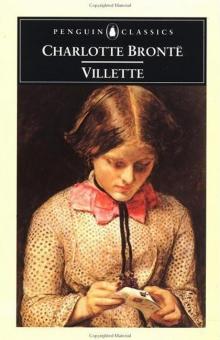 Villette
Villette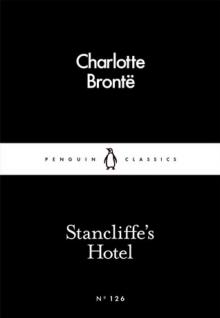 Stancliffe's Hotel
Stancliffe's Hotel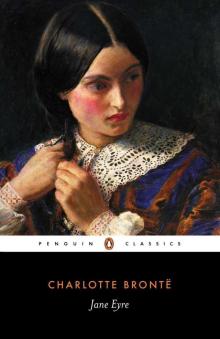 Jane Eyre
Jane Eyre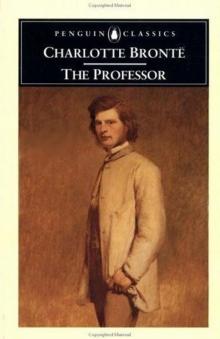 The Professor
The Professor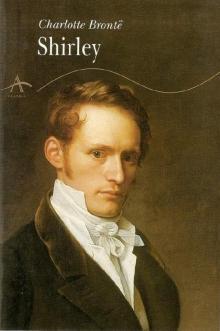 Shirley
Shirley The Complete Novels of Charlotte Brontë
The Complete Novels of Charlotte Brontë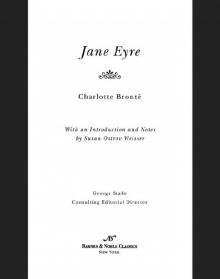 Jane Eyre (Barnes & Noble Classics Series)
Jane Eyre (Barnes & Noble Classics Series)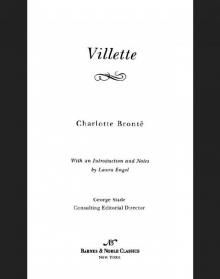 Villette (Barnes & Noble Classics Series)
Villette (Barnes & Noble Classics Series)